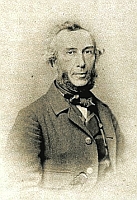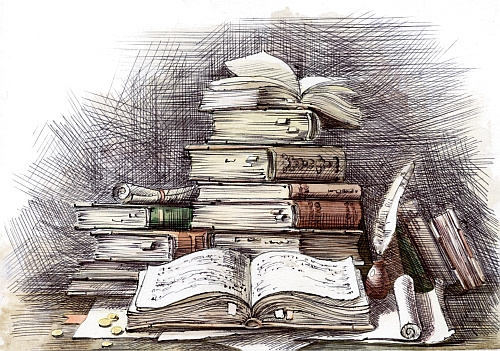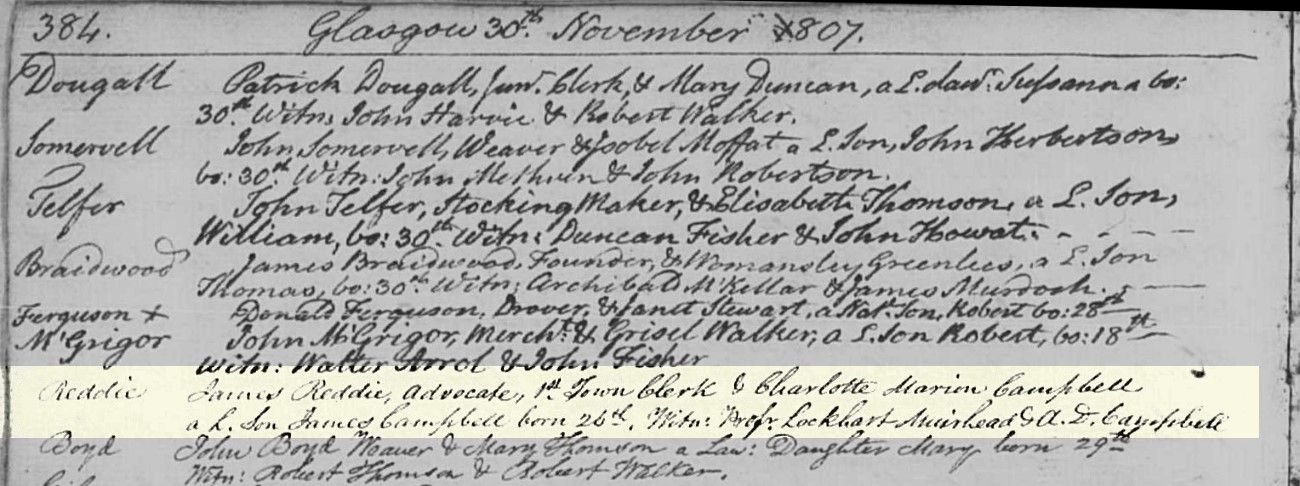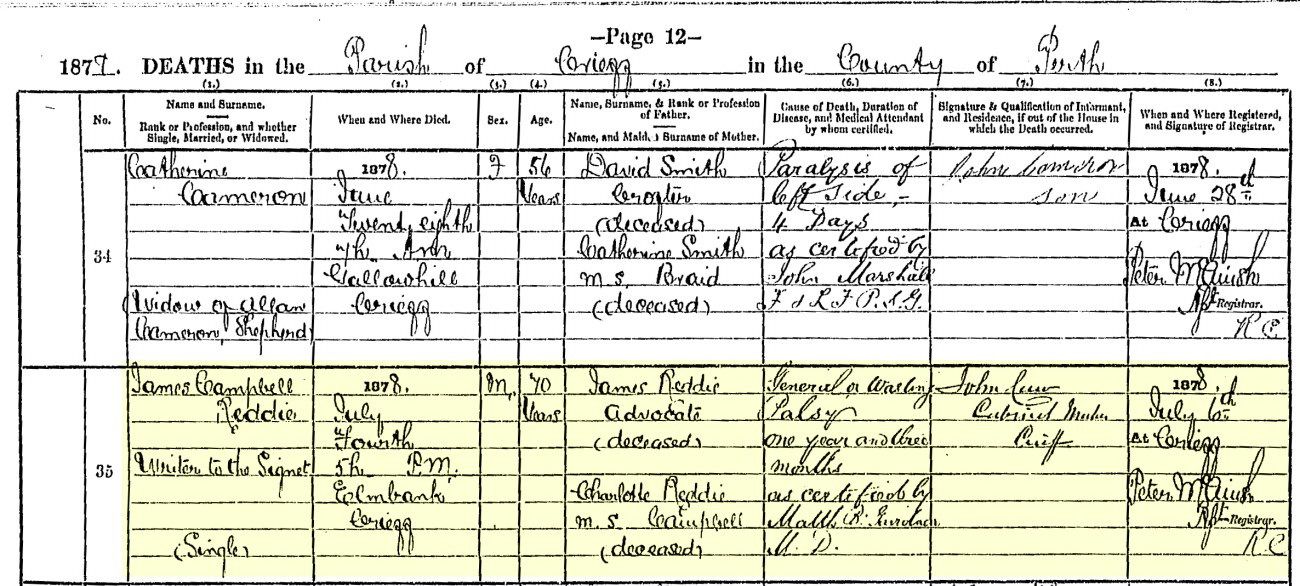James Campbell Reddie
A Biography of an Erotica Writer and Bibliophile
Copyright © 2010 Sheryl Perry

Ancestry & Family
James Campbell Reddie was born November 26, 1807 in Glasgow, Scotland; the third of eight children born to James Reddie (1775-1853) and Charlotte Marion Campbell (1782–1841).
James, Sr. was the son of John Reddie (1727–1805), a merchant in Dysart, Fife, Scotland, and May Burd (1744–1815). John and May married Oct. 26, 1766 in Tannadice, Scotland. James became the first town clerk of Glasgow about 1820, and later the town magistrate and advocate in Edinburgh. He married Charlotte Campbell on August 12, 1805 in Glasgow. Charlotte was the daughter of James Campbell (c.1735-c.1800) and Marion Muirhead (1739-1815). James and Marion married Aug. 30, 1763 in Govan, Scotland.
It appears James Reddie, Sr. and his son were estranged from the time James Campbell was a young adult until the death of his father on May 5, 1853; a father who didn't even know if his son was alive or not. He left the bulk of his estate to his daughter, Charlotte, who took care of her father during the last years of his life. Although, he did leave his son "the splendid Works of Voltaire in 72 volumes". The following is an excerpt from James, Sr.'s will in regards to his son:
"My second son James after his Professional Education Apprentice fee he received but little from me. Several of my plans for promoting and extending his business failed and as requested I had to give him a large Cash Credit with the Royal Bank - But being Cautioner for him to the Royal Bank to the extent of Two thousand Pounds and Interest. I have since he left us in the summer of 1845 had to pay to that bank for him in interim payments Four hundred pounds and upward of Two hundred and fifty pounds so as to reduce the Balance due to One Thousand six hundred Pounds for which I have assigned in security and payment of One thousand six hundred Pounds my life Policy with the Provident Office London worth at my death upwards of One thousand six hundred and forty Pounds - James therefore if alive has nothing to receive at my death.""
Children of James and Charlotte:
- John Reddie – b. May 16, 1805, d. Nov. 28, 1851 in Calcutta, India.
- Marion Reddie – b. Sep. 1, 1806.
- James Campbell Reddie – b. Nov. 26, 1807, d. Jul. 4, 1878 in Elmbank, Creiff, Scotland.
- George Burd Reddie – b. Apr. 21, 1809, d. Mar. 17, 1880 in Bath, Somerset, England.
- Charles Reddie – b. Apr. 18, 1810, d. aft 1881.
- Charlotte Marjory Reddie – b. May 29, 1814, d. Nov. 28, 1885 in Elmbank, Creiff, Scotland.
- Margaret Reddie – b. Jun. 16, 1860, d. aft 1891 in Elmbank, Creiff, Scotland.
- Robert Muirhead Reddie – b. May 29, 1818, d. Aug. 12, 1865 in Shanghai, China.
John Reddie was a Judge for the Small Debts Court in Calcutta. George Reddie retired from the Bengal army as a Major after 37 years of service. Charles was employed as a writer, which in Scotland usually meant solicitor. In Charles' case, however, he is not listed in the "Register of the Society of Writers to Her Majesty's Signet". Charles married Margaret Cleland Burns, daughter of Sir George Burns and Jane Cleland. Robert Reddie was an advocate in Calcutta and China.
James himself never married or had any children that we know of. Some erotica scholars have speculated through the years that he may have been homosexual or bi-sexual but so far no proof has been found to support this hypothesis.
Writer to the Signet
James was known by his full legal name in Edinburgh, Scotland where he worked as a Writer to the Signet. He began his apprenticeship under David Cleghorn on Dec. 10th, 1829 and continued in this profession until he relocated to England.
The Signet was the private seal of the early Scottish kings, and the Writers to the Signet were authorised to supervise its use and, later, to act as clerks to the Courts. Solicitors in the 17th and 18th centuries qualified by apprenticeship followed by an oral examination. In the 19th century attendance at Scottish university law courses in Edinburgh, Glasgow or Aberdeen became a common feature in a Scottish solicitor's education. An Act of Sederunt of the Court of Session in 1865 said all procurators, writers and law agents must apprentice for at least three years and satisfy the examination requirements of their society or faculty. Attendance at university was often the best way to acquire the knowledge for the exams, and for Writers to the Signet and Solicitors of the Supreme Court, it was compulsory.
London Calls
James relocated from Scotland to England in 1849, where he took the name James Campbell; dropping his father's surname in favor of his mother's. Was the name drop done out of anger and the desire to disown his father? Probably. Or perhaps it was simply a matter of him not wanting to embarrass his family should a friend or colleague of his father discover his illicit occupation as a writer of porn.
The first appearance of a James Campbell in England is in the 1851 England Census record, where he is shown living at 32 White Hart Street in Westminster; employed as a compositor (typesetter). The 1861 census shows him again as a lodger at 24 Manor-terrace in Newington, London; employed as a writer and translator. In 1871 he's living with the Adamo Pedroletti family at 44 Brecknock Rd. in Islington, London, England; and later at 26 Brecknock Crescent in 1875.
In the Nov. 1880 edition of The Pearl there appears a pornographic piece titled 'Memoranda from Mr. P—'. The first paragraph reads as follows: "Mr. Reddie used to call me Petro, as a short familiar name; but whilst he lodged with me at my house, Brecknock Crescent, Camden Town (N.B.– This is where I first was introduced to Mr. Reddie), I was continually afraid he would bring himself or both of us into serious trouble."
Erotica Collector & Bibliophile
According to Ashbee, James was a serious, exacting collector and bibliographer of erotica. When he aquired a new book he would immediately collate it, confront every available authority on it, and compare the book page by page, word by word with any other issue of the same work. If he was unable to acquire a scarce book, he frequently made copies by hand. He never refused to lend a book from his vast collection, even though often times the borrower would forget to return it. He was always liberal with his knowledge of erotica, imparting information gave him great satisfaction, and he spared neither time and labor in his research.
Writer & Translator of Erotica
Many of the original texts and translations of erotic literature published by William Lazenby and William Dugdale were the work of James Campbell. One of the earliest publications utilizing Campbell (still in Scotland at the time) was Dugdale's risqué newspaper The Exquisite. Published from 1842 to 1844, The Exquisite contained "...a great number of tales from the French, with a few from the Italian, translated for the most part, if not entirely, by James Campbell...".
The following are some of the titles he is known to have written or translated:
- The Curtain Drawn Up or the Education of Laura (c.1863 - published by Dugdale)
- Laura Middleton, Her Brother & her Lover (c.1865 - not published)
- Adventures of a Schoolboy (1866 - written by Campbell, illustrated by Sellon, published by Dugdale)
- The New Ladie's Tickler (1866 - illustrated by Sellon, published by Dugdale)
- Memoranda from Mr. P— (The Pearl, Nov. 1880)
- Sins of the Cities (c.1880s)
- The Amatory Experiences of a Surgeon (c.1881 - written by Campbell)
- The Philosophical Theresa or Memoirs of a Young Girl (c.1860 - published by Dugdale)
- Letters from a friend in Paris (c. 1874 - possibly written by Campbell)
- Mysteries of Verbena House or Miss Belfast Birched (possibly partially written by Campbell)
The Last Years
In April of 1877, Campbell decided to leave England and return to Scotland due to ill health. On July 25th, 1877, shortly before his departure, Campbell sold his collection of erotica to Henry Spencer Ashbee for £300 ($32,478.38 US). He also bestowed to Ashbee his three volume manuscript Bibliographical Notes on Books, which was an invaluable resource for Ashbee in preparing the second and third volumes of his Bibliography of Prohibited Books (vol.1 : 1877, vol.2: 1879, vol.3: 1885).
Ashbee died on July 29th, 1900. In his will, he bequeathed his entire collection of erotic literature to the British Library. Sometime after 1901, and possibly at the instance of Ashbee's son, the majority of books in the 'Ashbee Collection' (about 1000 unduplicated titles) were destroyed.
On July 4th, 1878 in Creiff, Perth, Scotland, James Campbell Reddie died from a "general or wasting palsy" (a progressive muscle degeneration and weakness), diagnosed 1 year and 3 months earlier. He is buried at the Glasgow Necropolis, along with his mother and father, and other family members. A memorial stone marks their graves.
Click on an image below to see the larger image:
This work on James Campbell Reddie is copyrighted.
The content may not be reproduced
in any form without my expressed permission.
Sources
Ashbee, Henry Spencer. Bibliography of Prohibited Books. Jack Brussel, 1962.
Gibson, Ian The Erotomaniac. Da Capro Press, 2001.
Mendes, Peter. Clandestine Erotic Fiction in English 1800-1930. Scolar Press, 1993.
Thomas, Donald. A Long Time Burning. Frederick A Praeger, 1969.
Secondary Sources
Census records for England and Scotland (Ancestry.com)
Dictionary of National Biography (Google Books)
History of the Society of Writers to Her Majesty's Signet (Google Books)
India Office Family History Search (British Library)
Law Review and Quarterly Journal of British and Foreign Jurisprudence (Google Books)
Pigot's National Commercial Directory of the Whole of Scotland, 1837 (Google Books)
Vital records and wills (ScotlandsPeople)





